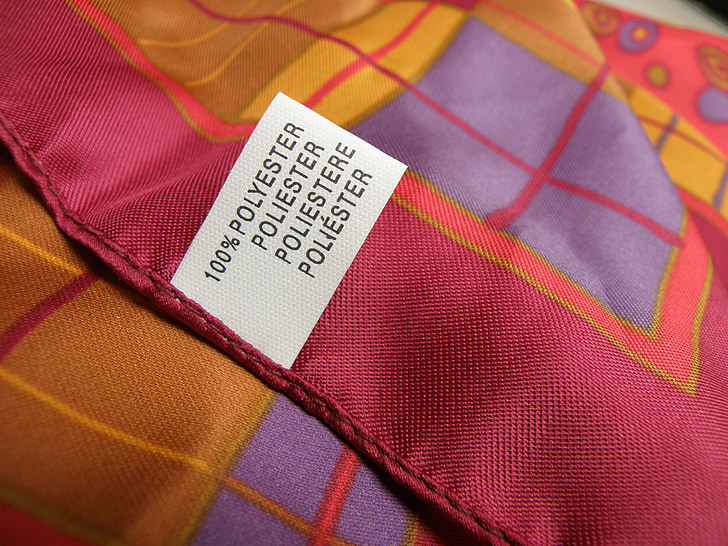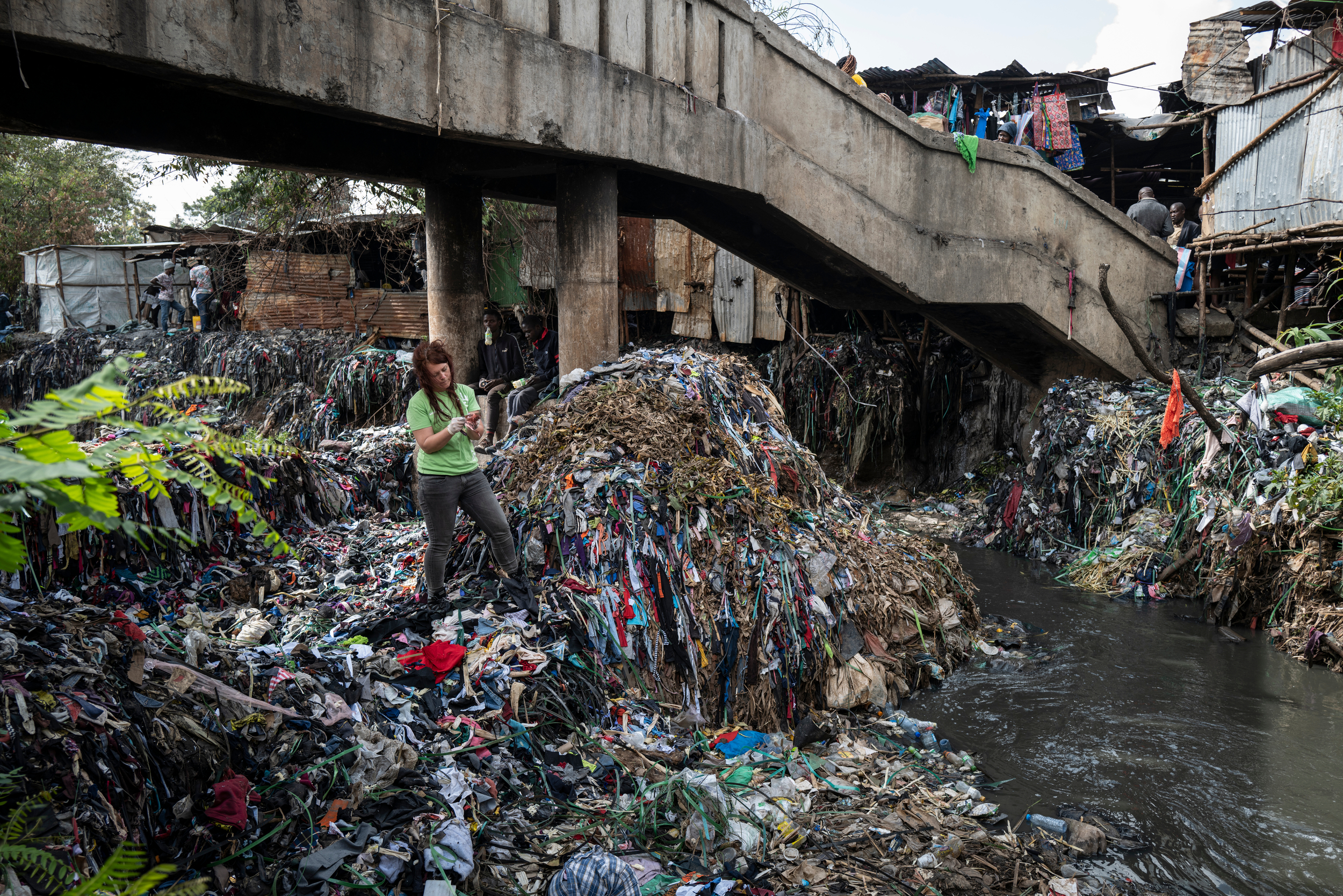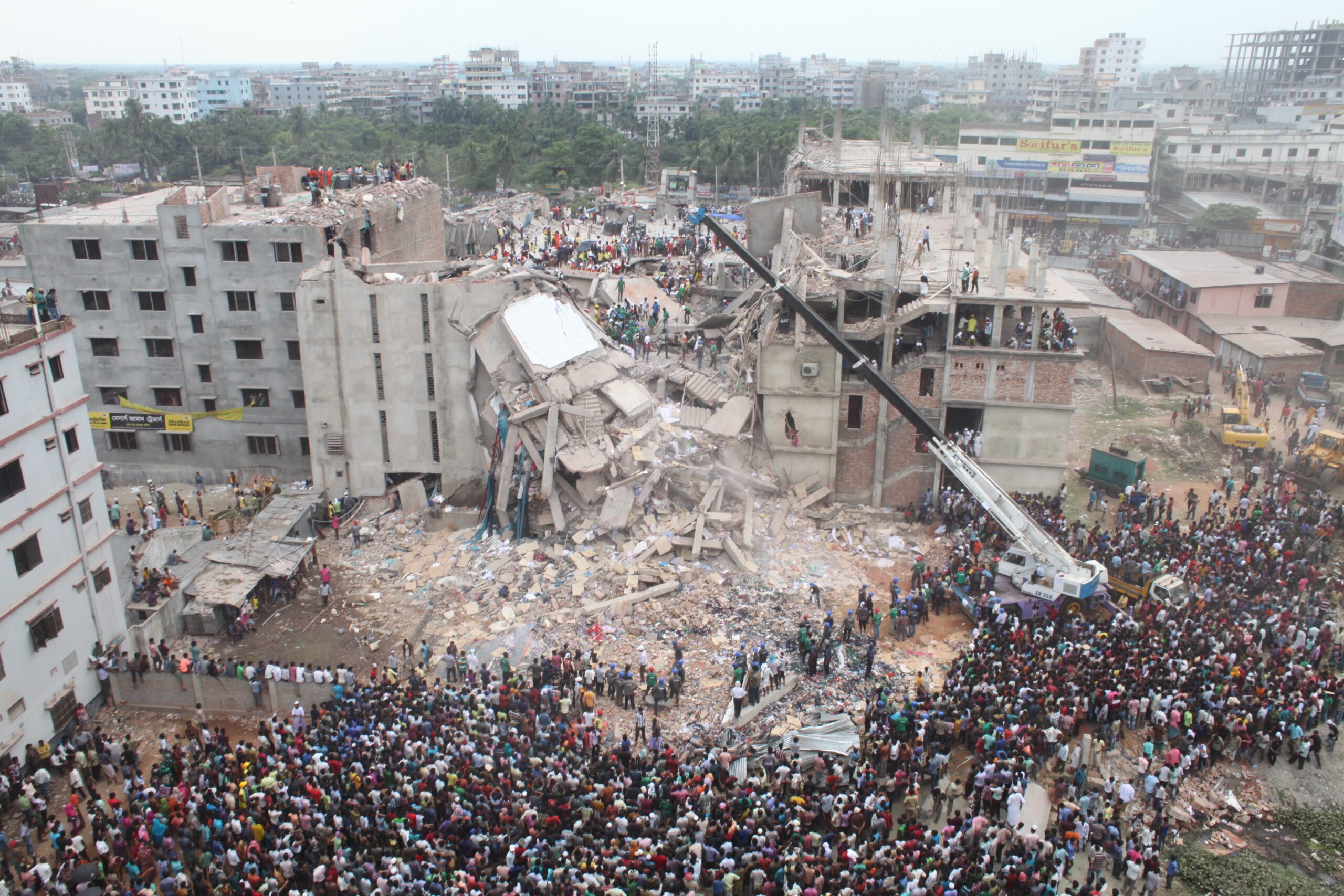
You know the feeling: wardrobe full of clothes, nothing to wear. Online, fashion sales fill your feeds. Clothes are cheaper than ever, and even cheaper in the sales, which now happen year-round.
Then there’s the other end of it all. The charity shop bag by the door that seems self-refilling; the rails in those shops full to bursting. The buyer’s remorse at the clothes clogging our closets.
Why is there so much clothing now? What’s it made of and who made it all? And where does it all end up when it’s no longer wanted?
Frankly, the fashion industry doesn’t want you to know the answers to these questions.
They don’t even want to reveal how many clothes they actually produce each year. 100 billion pieces a year is an estimate from a decade ago, before the explosion in ultra-cheap, disposable fashion from companies like Boohoo and Shein.
What we do know is that the unnecessary overproduction of clothing is a leading cause of climate change and plastic pollution. The demand for oil to make polyester is even fuelling Russia’s war, according to the Changing Markets Foundation.
And – even 10 years on from the Rana Plaza factory collapse – the fast fashion industry is still a chain of human misery. Some 75 million people (mostly women) are extremely poorly paid for skilled work in fashion manufacturing. Deadly industrial accidents still happen regularly.
Here’s what you need to know.
Most fast fashion contains fossil fuels
Plastic is made from oil and gas. Polyester is a thread made from plastic, woven into fabric. It’s thought over half of the clothes produced today use synthetic materials like polyester.
These materials often do not break down or can’t be recycled, which creates a massive plastic waste problem.
The oil industry has likely expected a hit on its profits coming, as much-needed climate action lowers the use of fossil fuels.
Luckily for them, the fast fashion industry has a seemingly endless demand for polyester. And the oil companies are seeking to take advantage of this demand.
A recent report even found fashion companies, such as New Look and Next, are inadvertently funding Russia’s war on Ukraine by using polyester made from Russian oil.
Partly because of all this plastic use, and the energy needed to process it, the fashion industry produces 8–10% of global CO2 emissions (4–5 billion tonnes annually). Along with demand for polyester, this is set to rise.
So the use of synthetic fabrics is a huge part of fashion’s role in climate change.
Clothing is a source of microplastics
Because polyester is basically plastic, it takes years to break down. Different synthetic fibres like polyester are often blended to make fabric, making them hard to separate.
When it’s left to break down in landfills, it pollutes the air, soil, and water with plastic microfibres and hazardous chemicals.
Each year, half a million tonnes of plastic microfibres shed from washing plastic-based textiles such as polyester, nylon, or acrylic, ending up in the ocean. That’s the equivalent of 50 billion plastic bottles.
Microplastics are everywhere – they moult off our fleeces into the air we breathe, and drain out of our washing machines and into the oceans.
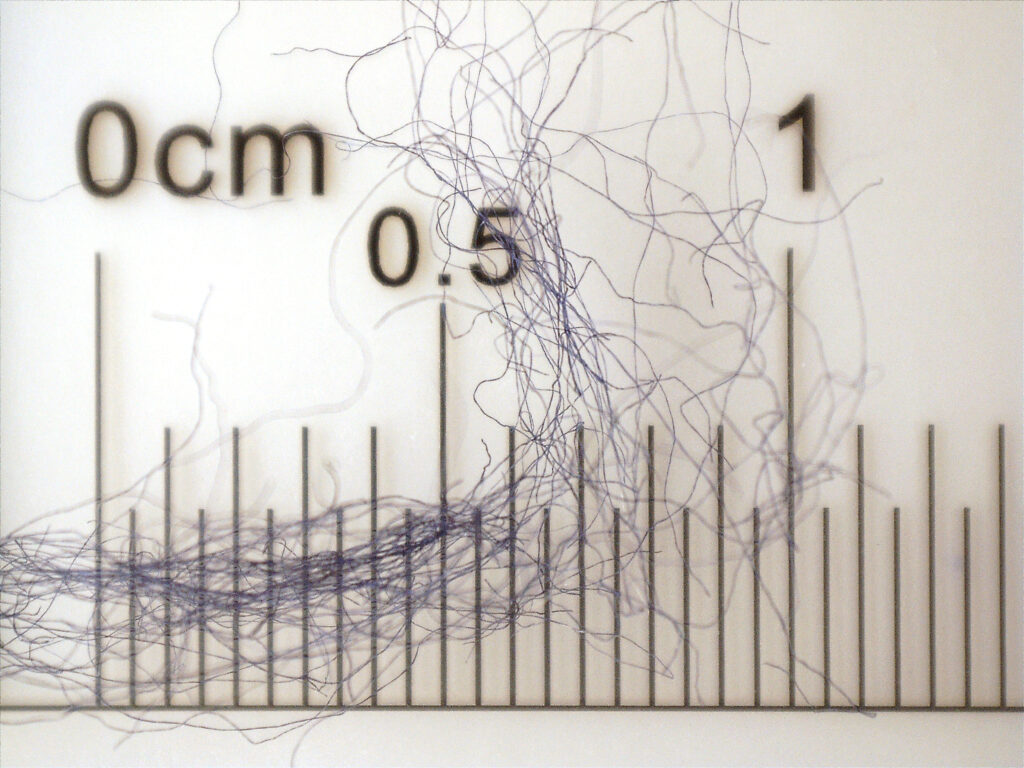
There’s clearly a huge problem here. These plastics not only pollute the environment – they are even getting into our bodies through water and food, with still unknown impacts on health.
We do need affordable clothing, but is this really the best way to go about it?
Fashion is made to become waste
Fashion should be about creativity and style, practicality and durability. But fast fashion companies have made it all about newness.
Companies push new trends endlessly and seasons now move faster than ever. Many of these items of clothing are simply made to become waste; to make way for the next brand-new batch of clothing.
Some estimates reckon the fashion industry is producing 100 billion articles of clothing a year – some 40% more than could ever be bought and actually worn. This figure is likely to be underestimated, and outdated.
Companies push new trends endlessly and seasons now move faster than ever. Many of these items of clothing are simply made to become waste; to make way for the next brand-new batch of clothing.
Companies create more clothes than we realistically need or want, or that we can dispose of safely. And because so much of it is all sold so cheaply, it becomes easy to buy – perhaps not even wear – and then to throw away.
And by “throw away”, of course we mean donate – because that feels good, doesn’t it? But donating to charity shops isn’t the perfect solution to our overflowing wardrobes it perhaps used to be.
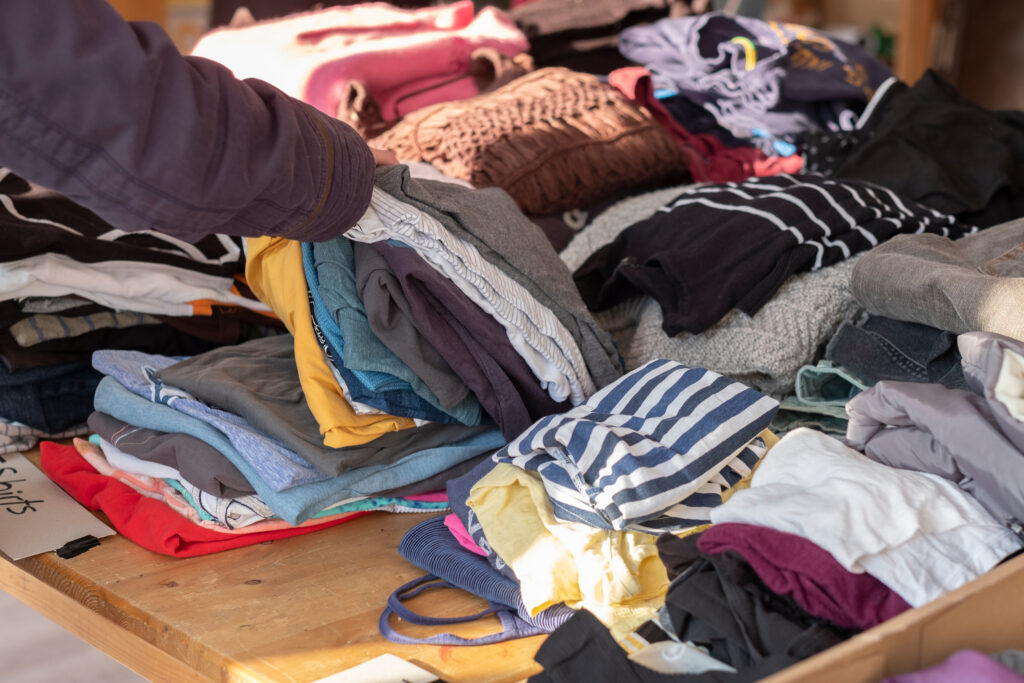
With the amount of clothes we’re dealing with, last season’s styles become rubbish pretty quickly, destined for landfills overseas.
The numbers are stark: only 10–30% of clothes you donate to the charity shops will be sold by them. Charity shops are so overwhelmed with clothing that’s basically waste, 70% of all the UK’s used clothing is sent overseas.
So where does all this clothing go?
Where can an estimated 92 million tonnes a year of waste clothing end up when it’s no longer wanted? (The numbers are so mind-boggling, but for comparison, one tonne is around the weight of a small car.)
Fashion wastelands in Africa and the Atacama Desert
A project called Dead White Man’s Clothes, after the name given to clothing exports from the West to Ghana, shows grimly the problem of fashion waste exports.
The UK is the biggest exporter to Ghana. In fact, the UK produces the most clothing waste in Europe. And we’re the second largest used clothing exporter in the world, after the US.
Traders and tailors in Accra’s Kantamanto market work hard to repurpose and sell the clothing that arrives on their shores.
The upcycling and reuse culture in Accra is a great example of what a more sustainable and circular fashion industry could look like.
But the sheer volume – and poorly constructed fast fashion items that aren’t made to last – means a lot of it is impossible to use and upcycle.
So it ends up in landfills, wrapped around the ropes of fishing boats near Accra, and strewn across beaches.
And Ghana isn’t the only country facing these massive problems. A recent investigation revealed that Europe is dumping 37 million pieces of plastic clothing on Kenya, too.
A 2022 Greenpeace report found massive fashion waste exports pouring into Kenya and Tanzania. In 2019 alone, 185,000 tonnes of second-hand clothes were imported into Kenya. In East Africa this second hand fashion is called “Mitumba”, a Kiswahili word meaning bale or bundle, because it is typically sold to retailers in bales.
30–40% of Mitumba imported to Kenya is of such bad quality that it cannot be sold anymore, meaning in 2019, Kenya had to deal with 150–200 tonnes of fashion and textile waste per day.
And there’s also the Atacama Desert, where piles of clothing waste were documented in 2021:
This is all very embarrassing for the fashion industry. They make too much – and they know it.
But what happens when clothing doesn’t even make it into the hands of buyers? Some of this brand-new, unworn clothing also ends up in places like Ghana.
A lot of it is sent to be burned.
The industry literally burns its own clothes
A lot of unsold stock from companies – knowingly producing far too much to drive prices down – is probably incinerated. But it’s an industry secret how much brand new fashion gets burned.
Burberry shocked the world by accidentally leaking details of its £26-million bonfire of luxury goods in 2018. So it’s no wonder the whole industry has doubled down on hiding their practices.
Why don’t these companies recycle these surplus clothes?
Recycling textiles can be difficult and expensive. Take a look at any clothing label – fibres are often so mixed up, they’ll never be separated and reused in any useful way. And again, with such large volumes, made with massive amounts of cheap materials, wastage in factories is also high.
Greenpeace’s investigative journalists from Unearthed found that garment waste from Nike, Ralph Lauren, Next, and other leading brands were burned to fuel brick kilns in Cambodia.
Because so much fashion is made from essentially plastic, burning it can be extremely toxic to health. The investigation found that black, choking smoke and noxious fumes exposed bonded workers to toxic chemicals – leading to coughs, colds, flus, nose bleeds and lung inflammation.
Usually such kilns would be fuelled by wood. But fashion waste is so plentiful (thanks to supplies being cheaper in larger quantities) that several hundred tons are being burned in Cambodia every day.
All clothing is handmade by skilled workers
While fashion disposal is clearly a huge problem, the human costs start where fast fashion is made.
Creating clothing is highly-skilled work. Whatever you are wearing right now, from your neckline to the toes of your socks, was crafted that way by a human being.
It’s just not possible for it to be done by machine. It’s done by a skilled operator of many different machines. They are mostly women working for rock-bottom wages in a punishing global system.
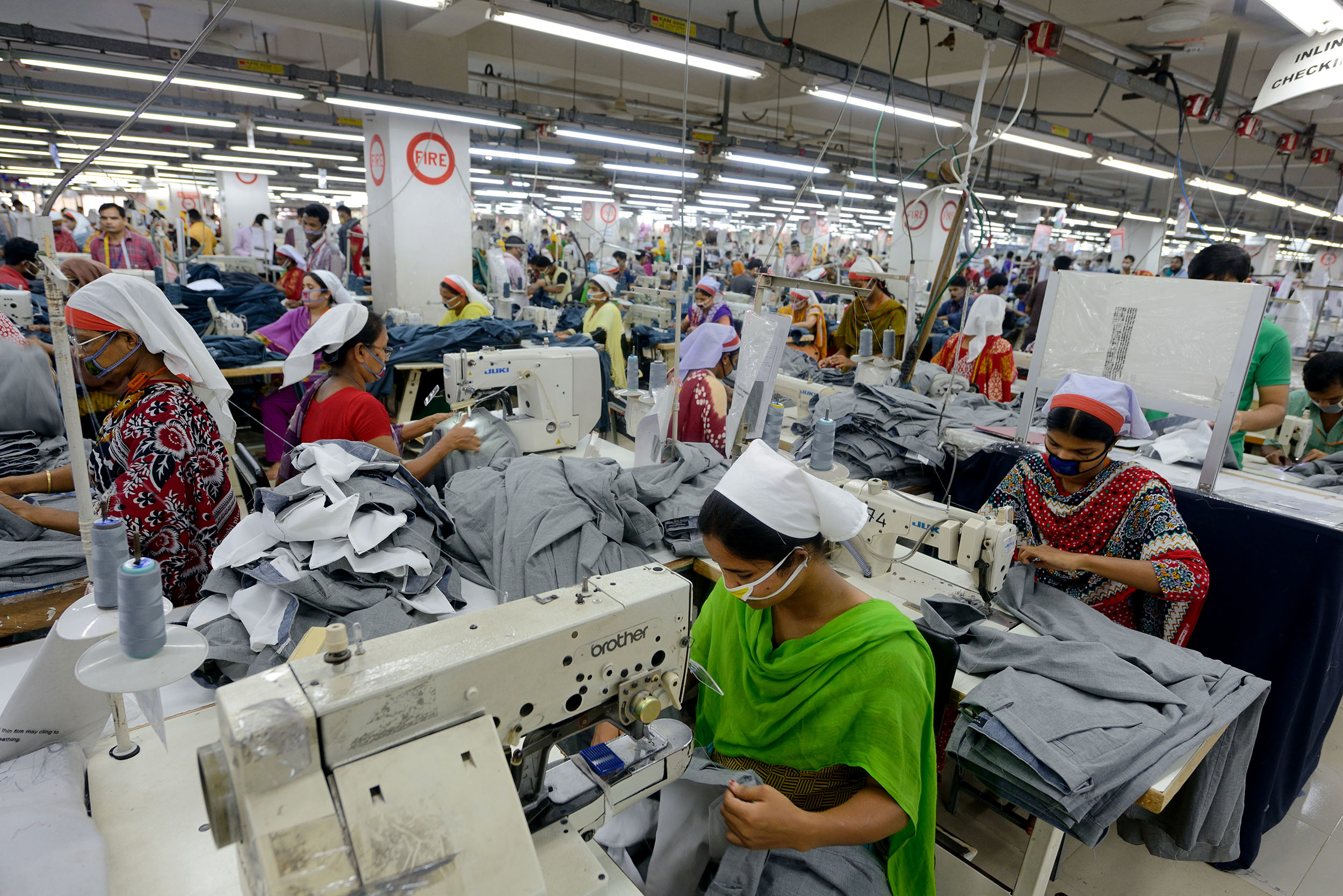
Whatever you are wearing right now, from your neckline to the toes of your socks, was crafted that way by a human being. It’s just not possible for it to be done by machine. It’s done by a skilled operator of many different machines.
Despite their skill, it takes an entire lifetime of toil for a garment worker to earn what a fashion CEO makes in four days.
When we treat clothes as disposable, we waste a precious resource – human labour. With any piece of clothing we come across, it’s always worth remembering that someone made it, carefully, with their hands – and likely with little reward.
We probably know this. But it’s become too easy to ignore.
Dangerous, low-paid work for ‘disposable’ clothes
The constant push for cheaper manufacturing traps skilled garment workers in extremely unsafe working conditions. Deadly fires frequently rip through clothing factories around the world. March 2020 alone saw 66 fires in factories across the industry – that’s two per day.
It’s been 10 years since the worst fashion factory disaster, and little has changed. The 2013 Rana Plaza factory collapse in Bangladesh killed 1,134 people and injured 2,500 (mostly young women).

These women knew their working conditions were dangerous.
The Rana Plaza building was declared unsafe in the days leading up to the collapse. Fashion companies forced the suppliers to fulfil their orders anyway.
Imagine working at your machine, in quiet terror, as the building cracked around you, sewing the hem of a garment that might never even be worn.
That was a decade ago, and if anything the problem of waste in fashion has gone into overdrive – the exploitation of lives; of human labour and skill; all the way to the garment waste ending up on Ghanaian beaches.
And sometimes, companies don’t pay the workers at all.
Just as the world went into COVID-19 lockdowns, the fashion industry owed $16 billion to garment workers for orders completed before the pandemic shut their stores. Some still haven’t been paid.
Around the same time, Boohoo suppliers in the UK forced workers in Leicester to make clothes for long hours through lockdowns, while paying less than minimum wage. Even after they were exposed, Boohoo’s profits soared – thanks to a captive online shopping audience during the pandemic.
How has it come to this? Do we now just accept that clothing has to be made from oil and misery – so it can remain dirt cheap, and far too plentiful? Is it our fault as customers who need clothing to function in society?
Fashion companies want us to blame ourselves
No matter our personal shopping habits, the companies are clearly the ones out of control here.
The truth is, we live in a global economic system that sees the exploitation of people and the environment as a fantastic opportunity to make huge profits.
Fashion is only one example, but it’s an eye-opening one. Fashion brands bulk order larger and larger amounts from factories, which lowers the price of each garment. But because they’re ordering so much (to make it cheaper per item), they’re creating far more clothing than could ever be sold or worn.
At this scale, it’s hard to conclude it’s simply “people buying clothes” that’s creating this global system of fossil fuel use, human rights abuses and plastic pollution. The companies make 40% more than we need anyway!

As well as exploiting workers and the environment, brands exploit our need for clothing by encouraging a wholly false “demand” among customers for more and more designs.
Chinese fast fashion company Shein already has tens of thousands of styles on their website, and adds around 1000 more each day. All just to keep the profit machine churning.
But this isn’t new. It’s as old as the global economy itself. Take cotton farming, which saw Europeans enslave Africans during the 1700s. This industry was encouraged by early royal “influencer” Marie Antoinette wearing fine cotton dresses.
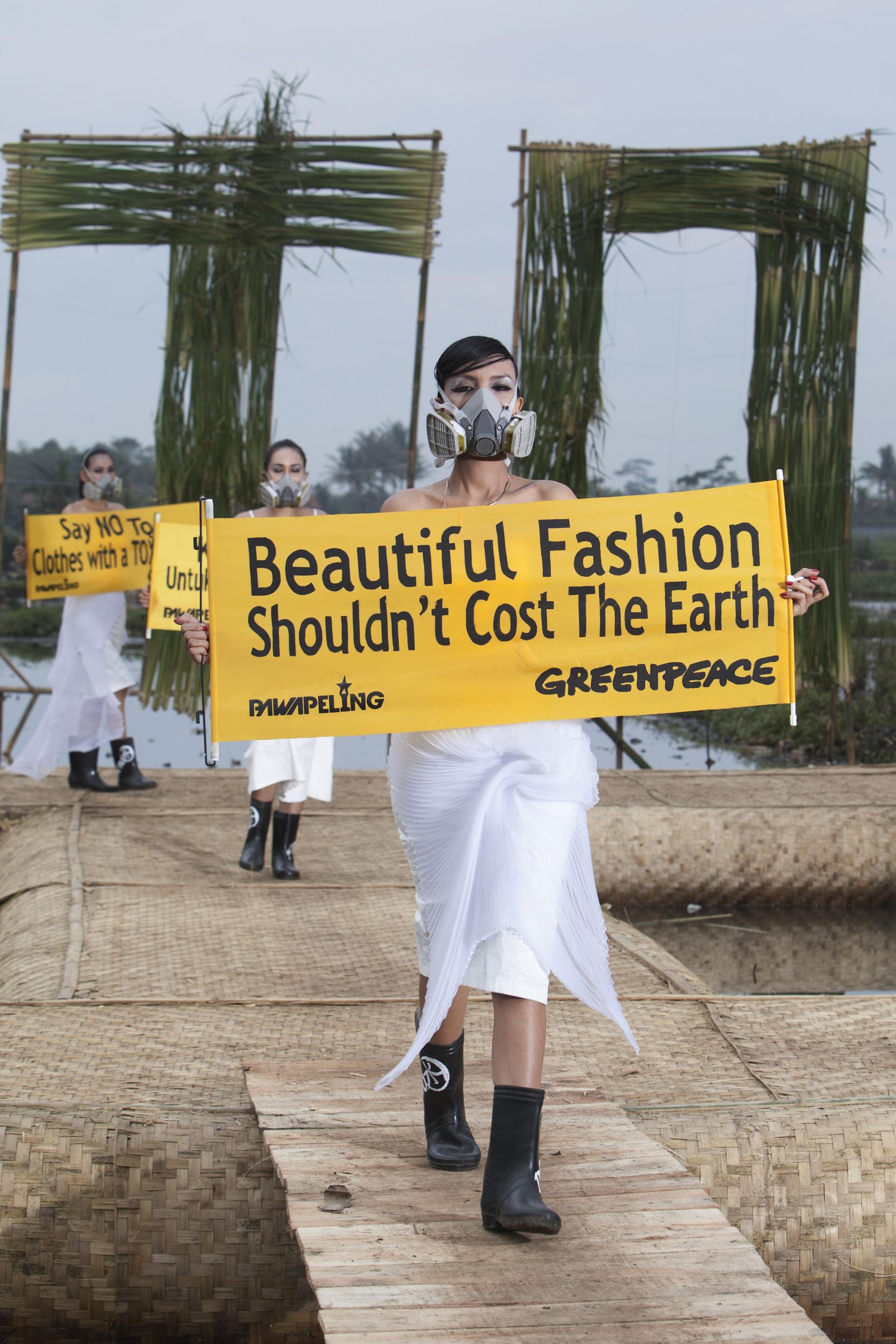
Can fashion change?
How to stop fashion brands churning out waste and misery
Industry solutions are mostly greenwash
Fast fashion companies are becoming experts at offering false solutions. It’s good PR to at least seem to be trying. And sustainability is trendy now, right?
But a lot of their solutions are nothing more than greenwashing.
This might look something like: H&M pretending to be able to recycle clothing using its “Green Machine”. But they know it’ll never happen at scale, because it’s so much cheaper to landfill or burn it. Or fast fashion brands Shein, Zara and Pretty Little Thing’s new resale platforms.
But none of this addresses the one (quite simple) thing they need to do: stop producing so many clothes.
H&M even admits this is the key crisis of the fashion industry, yet disagrees that cutting back is the solution.
Ultimately, it’s not our fault as individuals that the global fashion industry is in this mess. But it is within our power as consumers to think more about our purchases.
Governments, too, are unlikely to curb such a profitable industry.
An extensive enquiry and 2019 report by the UK Parliament’s Environmental Audit Committee (EAC) led to a series of impressive recommendations – all of which the UK Government rejected.
The government did pledge to launch a consultation on tackling textile waste by 2022. This was supposed to consider a possible “Extended Producer Responsibility” scheme and create requirements for product design, labelling and use of recycled materials. But nothing’s come of it yet.
So how can individuals actually make a difference?
Ultimately, it’s not our fault as individuals that the global fashion industry is in this mess. But it is within our power as consumers to think more about our purchases.
We all have to wear clothes, and they need to be affordable for everyone. But there is a better way.
Firstly, we can hold companies accountable for their promises. For example, the UK’s Green Claims Code might offer a way to call out companies that promise “green” collections or “recycled” garments.
Secondly, we can join campaigns that scrutinise fashion companies’ environmental and labour rights practices – such as Fashion Revolution or Labour Behind the Label.
Finally, we can develop a deeper connection with our clothing, to slowly but surely change the way fashion works for us – either as individuals or together.
This might be by buying second hand, or from sustainable brands.
Or it might be by joining up with communities that sell, swap, rent, mend or upcycle – like Sustainable Fashion Week. It could also be through making: learn to sew, crochet or knit to see just how much work goes into making one simple garment.
The good news is, everyone who buys and wears clothing can have a hand in bringing the fashion industry under control. Companies can’t keep selling single-use fashion made in miserable working conditions when there’s no demand for these products.
Now that we know about the long history of fashion exploiting people and the planet – from cotton demand fuelling slavery to polyester driving oil production and pollution – it must become just that: history.
Header illustration by Sarah Tanat-Jones.

